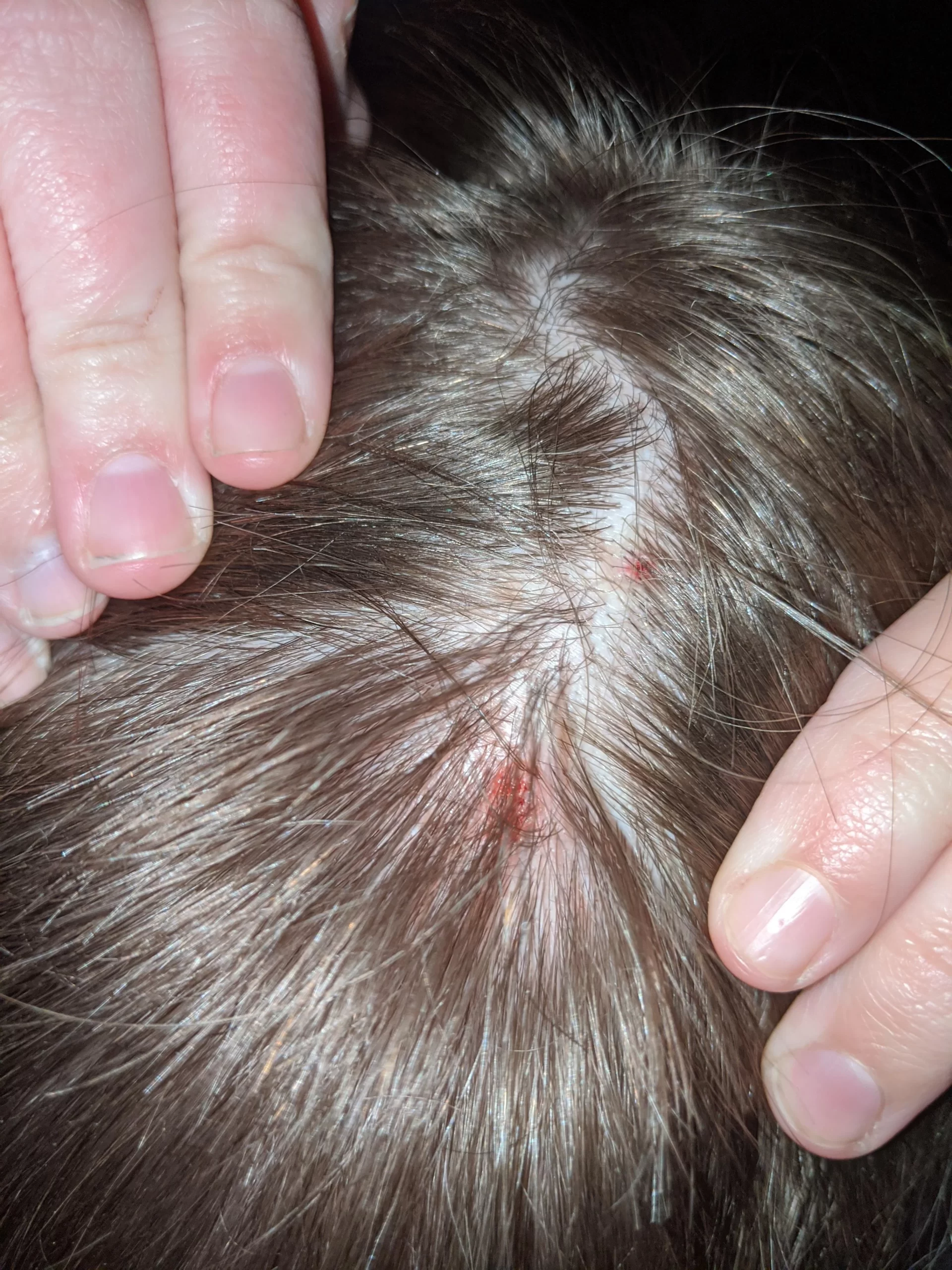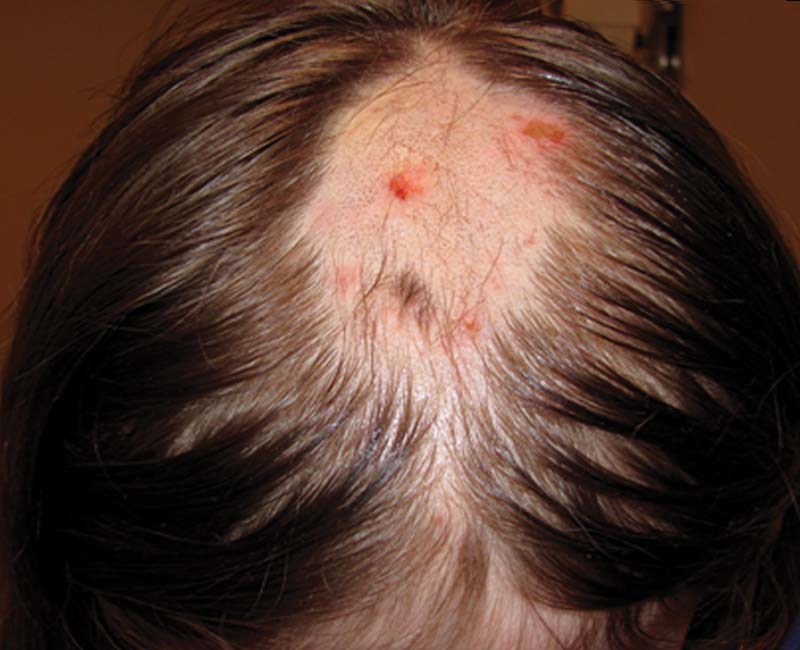You comb your hair and feel a tender spot; it can be frustrating. If you feel scalp tender in one spot of your head, it can happen for many reasons. No one likes this type of pain, and if you feel it, you should do something to cure it. When this happens, you ask yourself why is my scalp tender in one spot. This article will discuss the different reasons for scalp tenderness in one spot and provide information on how it can be treated. So, if you are experiencing scalp tenderness in one spot, read on to learn more about this condition and how it can be managed.
Before knowing the reason for scalp tenderness, let’s know its symptoms.
The main symptom of scalp tenderness is pain or discomfort in the scalp. Other symptoms may include:
Redness: The scalp may appear reddened or inflamed.
Swelling: The scalp may be swollen or puffy.
Itching: The scalp may be itchy.
Flakiness: The scalp may be flaky or have dandruff-like symptoms.
Tingling or burning sensation: The scalp may feel tingly or burned.
Sensitivity to touch: The affected area of the scalp may be sensitive to touch.
Table of Contents
Why is My Scalp FTender in one spot?
When you comb your hair and feel tender at one spot, it can happen for many reasons. Here are all the reasons that cause scalp tenderness in one spot.
Scalp infections: Bacterial or fungal infections of the scalp can cause tenderness, redness, and itching. These infections can cause by an overgrowth of microorganisms that are usually present on the skin. You can treat it with medicated shampoos or topical antifungal or antibiotic creams.
Scalp conditions: Certain scalp conditions, such as dandruff, seborrheic dermatitis, and psoriasis, can cause tenderness. Dandruff is a common condition that causes flaky skin on the scalp. It happens because of various factors, including dry skin, sensitivity to hair products, and a yeast-like fungus called Malassezia. Seborrheic dermatitis is a disease that causes scaly, red patches on the scalp and other body areas. Various factors, including hormonal changes, stress, and certain medical conditions, can cause it. Psoriasis is a disease that causes cells to build up rapidly on the skin’s surface, forming red, scaly patches. It can occur on any part of the body, including the scalp.
Hair styling practices: Tight hairstyles, such as braids or cornrows, can cause tension on the scalp and lead to tenderness. Wearing tight hairstyles for extended periods can cause irritation and inflammation of the scalp. In some possibilities, it can lead to hair loss. So, always do an easy hairstyle with minimal effects on hair.

Allergic reactions:
Some individuals may be allergic to specific hair products or chemicals, which can cause tenderness and irritation of the scalp. Common allergens include ingredients in hair dyes, shampoos, and styling products. If you suspect experiencing an allergic reaction to a hair product, it is crucial to stop using it and consult a doctor.
Hormonal changes: Hormonal fluctuations that occur during menopause or pregnancy can cause changes in the scalp that may lead to tenderness. During pregnancy, hormone levels can increase, leading to an increase in oil production on the scalp. This can cause the scalp to become more sensitive and prone to irritation. Menopause can also cause changes in hormone levels, which can lead to dryness and thinning of the hair.
Physical injury: Trauma to the scalp, such as a blow to the head, can cause tenderness. Scalp injuries can range from mild to severe and may require medical treatment depending on the extent of the injury.
Other Factors that can Cause Scalp Tenderness:
Sometimes environmental changes can also cause scalp tenderness; here are all factors that can cause it:
Weather: Extreme weather conditions, such as cold temperatures, high humidity, or prolonged sun exposure, can cause dryness and irritation of the scalp.
Pollution: Exposure to pollutants, such as chemicals, smoke, and dirt, can irritate the scalp and cause tenderness.
Swimming: Chlorine in swimming pools can strip the scalp of its natural oils, leading to scalp tenderness.
Chemical hair treatments: Harsh chemicals, such as hair dyes and straighteners, can irritate the scalp and cause tenderness.
Tips To Protect Scalp from Scalp Tenderness:
You can prevent scalp tenderness by taking steps to protect the scalp. Here are some tips to prevent scalp tenderness.
Use gentle hair care products: It is essential to choose hair care products that are sulfate-free and formulated for sensitive scalp. Sulfates often found in shampoos and other hair care products, can strip the scalp of its natural oils and cause dryness and irritation. Using products designed for sensitive scalps can help reduce the risk of irritation and tenderness. In addition, it is essential to avoid using harsh chemicals, such as hair dyes and straighteners, as they can irritate the scalp and cause tenderness.
Avoid tight hairstyles: If you frequently wear tight hairstyles, it is crucial to give your scalp a break by wearing loose or letting your hair down. This can help prevent scalp tension and reduce the risk of tenderness.
Protect the scalp from environmental irritants: To protect your scalp, try to cover your head with a hat or scarf when exposed to extreme weather conditions. You should avoid swimming in chlorinated pools as much as possible, as chlorine can strip the scalp of its natural oils and cause dryness and irritation.
Avoid scratching:
It is essential to resist the urge to scratch the scalp, as this can cause scalp tenderness. If your scalp is itchy, try using a gentle, nourishing hair oil or scalp serum to moisturize the scalp and reduce the urge to scratch.
Eat a healthy diet: A diet that is full of nutrients, such as vitamins, minerals, and essential fatty acids, can help to nourish the scalp and promote healthy hair growth. Foods particularly beneficial for the scalp include nuts, seeds, and leafy green vegetables.
By following these tips, you can help to prevent scalp tenderness and maintain the health of your scalp. Now let’s know some treatments that can cure scalp tenderness; you can take it as an answer to why is my scalp tender in one spot.
Treatments:
Treatment for scalp tenderness will depend on the underlying cause of the condition. Here are some treatment options:
Medicated shampoos: If the scalp tenderness happens to an infection, such as dandruff or seborrheic dermatitis, your healthcare professional may recommend using medicated shampoos. These shampoos contain ingredients such as zinc pyrithione, salicylic acid, or selenium sulfide, which can help to control the growth of microorganisms on the scalp and reduce inflammation.
Topical creams: If scalp tenderness happens to a skin condition like psoriasis or eczema, your healthcare professional may recommend topical creams. These creams may contain corticosteroids, which can help reduce inflammation, or calcipotriol, which can help slow skin cell growth.

Lifestyle changes: Making certain lifestyle changes may also help treat scalp tenderness. For example, if tight hairstyles cause tension on the scalp, you may need to modify your hair styling practices. Avoiding certain hair products or chemicals causing an allergic reaction can also be helpful.
Stress management: In some cases, scalp tenderness may be related to stress or anxiety. Stress-reducing activities like exercise, meditation, or therapy may help reduce scalp tenderness.
Physical therapy: If the scalp tenderness is related to physical injuries, such as a blow to the head, physical therapy may help improve healing and reduce discomfort.
It is essential to consult with a healthcare professional for proper diagnosis and treatment of scalp tenderness. They will be able to determine the condition’s underlying cause and recommend the most appropriate course of treatment.
Conclusion:
Before this article, you were wondering why is my scalp tender in one spot. It happens because of various factors, including infections, scalp conditions, hair styling practices, allergic reactions, and physical injury. If you are experiencing tenderness in a specific area of your scalp, you must consult a healthcare professional for proper diagnosis and treatment. With their medications, your problem will go away. Finally, if you have a home remedy to cure scalp tenderness, tell us in the comments.